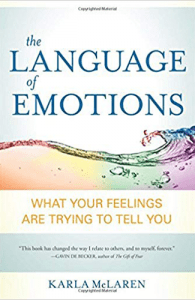 In her book, The Language of Emotions: What Your Feelings Are Trying To Tell You, Karla McLaren is advocating for creating a conscious life, conscious relationships, and conscious communities. We need to reclaim and reinvent our relationship with our emotions, and, as a result, revive our essential natures. We are not just logical, rational, left-brain beings. We are also intuitive, knowing, sensing and feeling, creative right brain beings.
In her book, The Language of Emotions: What Your Feelings Are Trying To Tell You, Karla McLaren is advocating for creating a conscious life, conscious relationships, and conscious communities. We need to reclaim and reinvent our relationship with our emotions, and, as a result, revive our essential natures. We are not just logical, rational, left-brain beings. We are also intuitive, knowing, sensing and feeling, creative right brain beings.
Our emotions are a language too. They have things to tell us. They are messengers, filled with vital guidance. While some of us tend to be more emotional than others, we are all emotional beings. Having a relationship with our emotions and endeavoring to understand them better, will enable us to know ourselves better, resolve old traumas, heal old wounds, build healthier relationships, stay calm in the chaos, and come home to our true selves.
McLaren teaches us how anger helps us to protect and restore ourselves, that apathy and boredom are masks for anger, how guilt and shame restore integrity. Or, how fear activates intuition and gets us into action, right action and right relationship, if we’re paying attention. She offers that confusion is a mask for fear and hatred serves as a profound mirror, an invitation to shadow work. Sadness can guide us into release and rejuvenation, grief to the depths of our soul.
As someone who has lost a sibling, family members and friends to suicide, and who has wrestled with suicidal tendencies myself, it is interesting to imagine suicidal urges as the darkness before dawn; or to embrace joy as an affirmation of affinity and communion.
In Chapter 10, Building Your Raft, McLaren offers five empathic skills as “a raft to navigate competently through your emotions, your thoughts, your sensations, and your visions.” These skills/practices include: getting grounded/grounding yourself, defining your boundaries/breathing with your boundaries, burning contracts (releasing trapped emotions and behaviors), conscious complaining (feeling how you feel versus telling yourself how you feel), and rejuvenating yourself. The latter is about “helping you to refresh yourself so you can meet each new experience with focus and intention.”
The more we endeavor to understand and embrace our emotions, the less they will have a grip on us and unconsciously run our lives. I advocate for having a relationship with each emotion rather than having a relationship with our thoughts about each emotion. It is a trap that spins us solidly into the victim’s triangle and away from empowerment.
By embracing and having a relationship with our emotions, we can show up as we intend, live an empowered life and make room for more joy.
(Find this book in the Recommended Reading section of my website, under: Guiding Principle #2 — Keep the Lines of Communication Open)





